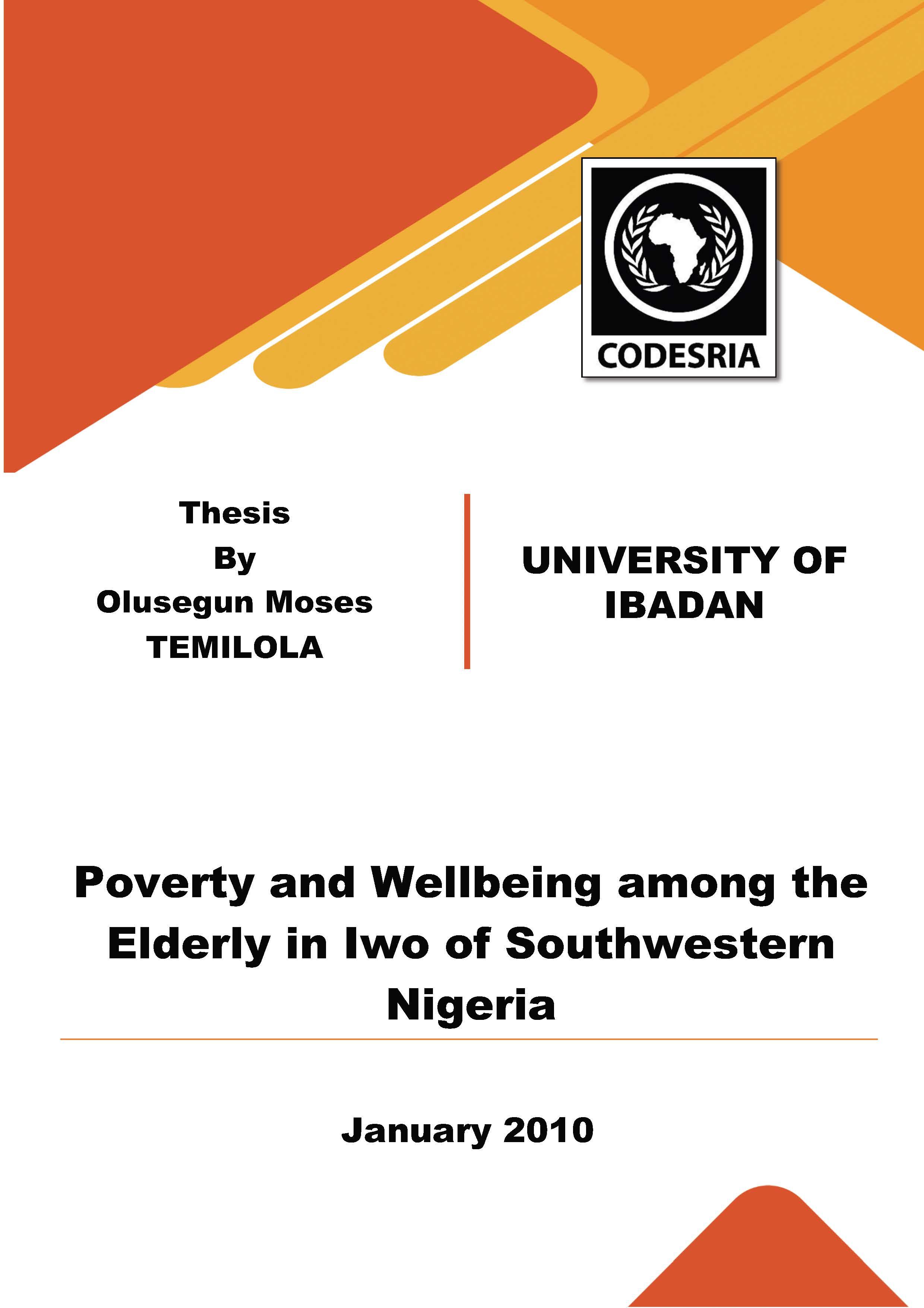Poverty and Wellbeing among the Elderly in Iwo of Southwestern Nigeria
Mots-clés :
Ageing, Cultural practices, Health outcomes, Wealth inequality, IwoSynopsis
The wellbeing of the elderly is of major concern due to their increasing proportion in African countries. The majority of elderly Africans aged 60 years and older live in poor economic conditions with little or no access to electricity, employment, housing,
healthcare, safe water, refuse disposal and toilet facilities. In Nigeria the elderly constitutes more than 5% of the population. Their poor economic condition is heightened by the devastating effects of HIV/Aills, emigration of young family members and economic crisis. There is little information on the wellbeing of the elderly living in economically constrained societies. The study, therefore, examined the -link between . poverty and wellbeing of the elderly in Iwo, Osun State.
Anthony Giddens' Structuration and Self-Management Ability of Aging Theories were adopted for the study. A total of 525 copies of the questionnaire were administered on Yoruba-speaking respondents at the household level in Iwo. Twenty In-Depth Interviews (IDis) and 20 Focus Group Discussions (FGDs) were conducted among male and female elderly persons. Poverty was measured using Household Wealth Inequality Index (HWII) which determines the economic position of a particular household based on its assets, while wellbeing was assessed by WHO composite health domains namely health problems, sensory impairments, functional limitations and disability. Ethnographic summaries and content analysis were used to analyse qualitative data. Logistic regression was used to determine the dominant factors of association between poverty and health outcomes among the elderly persons.
Seventy-four percent of the respondents had limited access to less than NlOOO monthly. They lived in poor ho1,1sing conditions witho1,1t toilet facility, electricity, safe water and garbage disposal. Twenty-six percent of them reported having hearing impairment and 22.4% had poor sight. Respondents reported having arthritis (52.9%), headaches (38.8%), fever (52.0%) and chest pain (18.4%) among other health challenges confronting them. Logistic regression results controlled for age and gender showed that the wellbeing of the elderly persons is negatively significantly related to each of the health outcomes namely health symptoms, sensory impairments, functional limitations and disability. Age groups were positively related to reporting more health problems (~2 =43.21, p<0.05). Qualitative data revealed that lack of children care, landlessness, o\lt-migration of young family members, economic crisis were perceived determinants increasing poverty and generating health challenges among them. The FGD data further revealed that taking of herbs (agbo & agunmu), special meals (aseje & agunje), special chewing-stick (orin-agba), body-incision (gbeere) and sacrifices ( ebo) were some of the cultural practices perceived as enhancing the wellbeing of the elderly persons.
,Socioeconomic wellbeing of the elderly in Iwo is poor and this has affected their instromen~I activitills of daily living. Access to formal and informal social and economic security and health promotion strategies are needed to enable elderly persons to overcome the challenges of old age poverty and ill-health.
Téléchargements
Références
Subramanian, S. 1997 'Introduction' in Subramanian, S. (ed) Measurement of Inequality and Poverty, Oxford:Oxford University Press.
Tendulkar, P.1992. Poverty and Social Policies. HelpAge International Programme Tibbitts, C (ed.). 1960. Handbook of Social Gerontology. University of Chicago Press. Chicago.
Thorbecke, E. 2005. Multi-dimensional Poverty: Conceptual and Measurement Issues.
The Many Dimensions of Poverty International Conference, UNDP International Poverty Centre, Brasilia.
Togonu-Bickersteth, F; Akinnawo, E.O; Akinyode, O.S and Ayeni,E. 1996. "Social Support Networks and Adoption in Old Age in Southwestern Nigeria"; Ile-Ife: Obafemi Awolowo University, Department of Psychology.
Togonu-Bickersteth, F. 1989. "Conflicts over care giving: a discussion of filial obligation among adult children in Nigeria". Journal of Cross-Cultural Gerontology. Vol 11, p 35-48
Togonu-Bickersteth, F. 1986. "Age Identification Among-Yoruba Aged". Journal of Gerontology, 16141, pp 110-113.
Togonu-Bickersteth, F. 1997. Public alms solicitation among the Yoruba elderly in Nigeria. Unpublished Paper presented in Ile-Ife, Obafemi Awolowo University, Department of Psychology
Tout, K. 1989. Ageing in Developing Countries. Oxford University Press, Oxford.
Troisi, J. 2004. "Ageing in Africa: Older persons as a resource" A paper presented at the International Conference on "Rapid Ageing and the changing role of the elderly in African households", Organized by the Union for African Population Studies UAPS/UEPA (Senegal), the HSRC in collaboration with the Department of Social Development (South Africa) 18-20 August,.2004, Pretoria, South Africa.
Udegbe, LB. 1990. "An Examination of Predictors of Adjustment in Old Age amongst some elderly Nigerian women". A project monograph for the Social Science Research Council ofNigeria. 1991. "Supporting Older Women in Nigeria: Current Issues. and Implications". Journal oflssues in Social Sciences, Vol I, pp 71-77
United Nations. 1985. The world ageing situation: strategies and policies. New York, United Nations.
United Nations. 1991. World Population prospect. New York ( document ST/SA/SER.A/120.
United Nations. 1999. The aging of the world's population: preparing for the international year of older persons in 1999. New York: Department of Public Information, ppl-7






